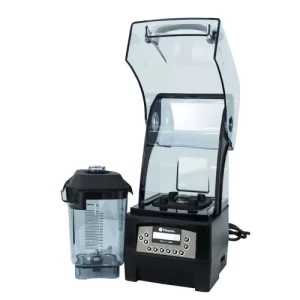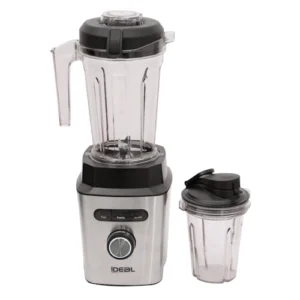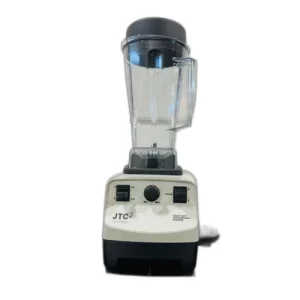Commercial Blender
Commercial Blenders: Your Comprehensive Guide
In the world of food and beverage preparation, commercial blenders are indispensable tools that enhance efficiency, consistency, and creativity. From smoothie bars to restaurants and catering services, these powerful appliances are designed to meet the rigorous demands of high-volume environments. This guide will delve into everything you need to know about commercial blenders, including their benefits, types, features, and essential buying considerations. Additionally, we will address common questions in an FAQ section to help you make informed decisions for your e-commerce needs.
What is a Commercial Blender?
A commercial blender is a high-performance blending appliance specifically designed for use in professional kitchens, bars, and restaurants. Unlike household blenders, commercial blenders are built to withstand frequent use, offering greater power, durability, and capacity. They can efficiently blend a variety of ingredients, from smoothies and soups to sauces and purees, making them essential for culinary professionals.
Key Features of Commercial Blenders
- Powerful Motors: Commercial blenders typically feature motors ranging from 1,000 to 3,000 watts. This high wattage enables them to handle tough ingredients, crush ice, and produce smooth blends quickly.
- Large Capacity: Many commercial blenders come with large containers, often ranging from 48 to 96 ounces, allowing for bulk preparation. This feature is particularly useful in busy kitchens where time is of the essence.
- Durable Construction: Made from high-quality materials, commercial blenders are designed to withstand heavy use. Stainless steel blades and robust containers are common, ensuring longevity and reliability.
- Variable Speed Settings: Most commercial blenders offer multiple speed settings, allowing chefs to adjust blending speeds for different tasks, from gentle mixing to high-speed blending.
- Pre-Programmed Functions: Many models come equipped with pre-set programs for common tasks like making smoothies, soups, or sauces, streamlining the preparation process.
- Easy Cleaning: Commercial blenders often feature designs that facilitate easy cleaning, with some models offering self-cleaning capabilities.
Benefits of Using Commercial Blenders
Investing in a commercial blender comes with numerous advantages that can enhance your kitchen operations:
1. Efficiency
Commercial blenders are designed for high-volume use, enabling quick preparation of food and beverages. This efficiency is crucial in busy environments where time is money.
2. Consistency
High-quality commercial blenders ensure uniformity in texture and flavor, allowing you to maintain the quality of your products across batches. This consistency is vital for brand reputation.
3. Versatility
These blenders can handle a wide range of ingredients and tasks, making them suitable for various applications, including:
- Smoothies and Juices: Create delicious, healthy beverages in seconds.
- Soups and Sauces: Blend ingredients directly in the pot for creamy soups and sauces.
- Dips and Spreads: Make salsas, hummus, and nut butters with ease.
4. Durability
Commercial blenders are built to last, with sturdy components that can withstand the rigors of daily use in a professional kitchen. This durability means fewer replacements and repairs over time.
5. User-Friendly Design
Most commercial blenders are designed with user convenience in mind. Simple controls, clear displays, and ergonomic designs make them easy to operate, even for inexperienced staff.
6. Safety Features
Many commercial blenders come equipped with safety features such as locking lids and automatic shut-off functions, minimizing the risk of accidents in a busy kitchen.
Types of Commercial Blenders
When selecting a commercial blender, it’s essential to consider the specific types available, each suited for different tasks:
1. Countertop Blenders
Countertop blenders are the most common type used in commercial settings. They are versatile and ideal for making smoothies, soups, and sauces. They typically feature a large base for stability and come with various speed settings.
2. Bar Blenders
Bar blenders are designed specifically for cocktail preparation and are usually smaller and more powerful than countertop blenders. They excel at crushing ice and blending frozen ingredients, making them ideal for bars and cafes.
3. Immersion Blenders
Also known as stick blenders, immersion blenders are handheld devices that can blend ingredients directly in the pot or container. They are perfect for soups, sauces, and purees and are easy to clean and store.
4. Heavy-Duty Blenders
Heavy-duty blenders are built for high-volume use and can blend large batches of ingredients quickly. They are ideal for restaurants and catering services where efficiency is crucial.
5. Food Processor Blenders
Some commercial blenders come with food processing capabilities, allowing them to slice, chop, and shred ingredients in addition to blending. This versatility can save space and reduce the need for multiple appliances.
Factors to Consider When Buying a Commercial Blender
When choosing a commercial blender for your e-commerce business, consider the following factors to ensure you select the best model for your needs:
1. Motor Power
The power of the motor is crucial for performance. Look for blenders with at least 1,000 watts for general use. For heavy-duty applications or frequent ice crushing, consider models with 1,500 watts or more.
2. Container Capacity
Choose a blender with an appropriate container size based on your typical batch sizes. For restaurants and cafes, larger containers (64 ounces or more) may be necessary for efficient preparation.
3. Blade Quality
High-quality stainless steel blades are essential for effective blending. Consider models with sharp, durable blades that can handle tough ingredients and produce smooth results.
4. Speed Settings
Look for blenders with multiple speed options and pre-programmed functions. This versatility allows you to adjust blending speeds based on the ingredients and desired texture.
5. Ease of Cleaning
Choose a blender that is easy to clean. Some models feature self-cleaning functions, while others have containers that can be easily disassembled for thorough cleaning.
6. Durability
Invest in a blender made from high-quality materials that can withstand the rigors of a commercial kitchen. Look for models with warranties to protect your investment.
7. Price
Commercial blenders can vary widely in price. Determine your budget but prioritize quality and features to ensure you get the best value for your money.
8. Noise Level
Consider the noise level of the blender, especially if you’re working in an environment where sound is a concern. Some models are designed to operate more quietly than others.
9. Safety Features
Safety features such as locking lids and automatic shut-off can enhance workplace safety. Look for blenders that prioritize user safety.
10. Brand Reputation
Choose a blender from a reputable brand known for producing high-quality kitchen appliances. Check reviews and ratings to gauge the experiences of other users.
Frequently Asked Questions (FAQs)
1. What is the difference between a commercial blender and a regular blender?
Commercial blenders are designed for high-volume use and have more powerful motors, larger containers, and durable components compared to regular blenders. They can handle tougher ingredients and are built to withstand frequent use in professional settings.
2. Can commercial blenders make hot soups?
Yes, many commercial blenders can blend hot ingredients, allowing you to create soups directly in the blender. Ensure the model is designed for hot liquids and follow the manufacturer’s guidelines.
3. Are commercial blenders noisy?
While commercial blenders can be louder than regular blenders due to their powerful motors, some models are designed to operate more quietly. If noise is a concern, look for blenders specifically marketed as quiet.
4. Can I make nut butters in a commercial blender?
Absolutely! Commercial blenders are excellent for making nut butters. Their powerful motors can easily process nuts into smooth and creamy spreads.
5. How do I clean a commercial blender?
Most commercial blenders come with a self-cleaning feature. Simply add warm water and a drop of dish soap, then blend on high for a few seconds. Rinse and dry the container after cleaning.
6. What is the average lifespan of a commercial blender?
With proper care and maintenance, a commercial blender can last anywhere from 5 to 10 years. Investing in a high-quality model can extend its lifespan even further.
7. Do I need to thaw frozen ingredients before blending?
While many commercial blenders can handle frozen ingredients, for best results, you may want to let them sit at room temperature for a few minutes. This can make blending easier and prevent motor strain.
8. What types of containers are best for commercial blenders?
Both BPA-free plastic and glass containers have their advantages. Plastic containers are lightweight and shatterproof, while glass containers are more durable and resistant to staining. Choose based on your needs.
9. Are there commercial blenders specifically for bars?
Yes, many bar blenders are designed to handle frozen ingredients and crush ice effectively. They are often smaller and more powerful, making them ideal for cocktail preparation.
10. What is the warranty period for commercial blenders?
Warranty periods vary by manufacturer, but most commercial blenders come with warranties ranging from 1 to 5 years. Always check the warranty terms before purchasing.
Conclusion
Commercial blenders are essential tools for any professional kitchen, offering power, versatility, and efficiency that can significantly enhance food and beverage preparation. Understanding the various features, benefits, and types of commercial blenders available will help you make an informed decision.
By investing in a high-quality commercial blender, you can streamline your operations, maintain product consistency, and elevate the culinary experience for your customers. Whether you run a restaurant, cafe, or catering service, the right commercial blender will be a valuable addition to your kitchen equipment lineup.








